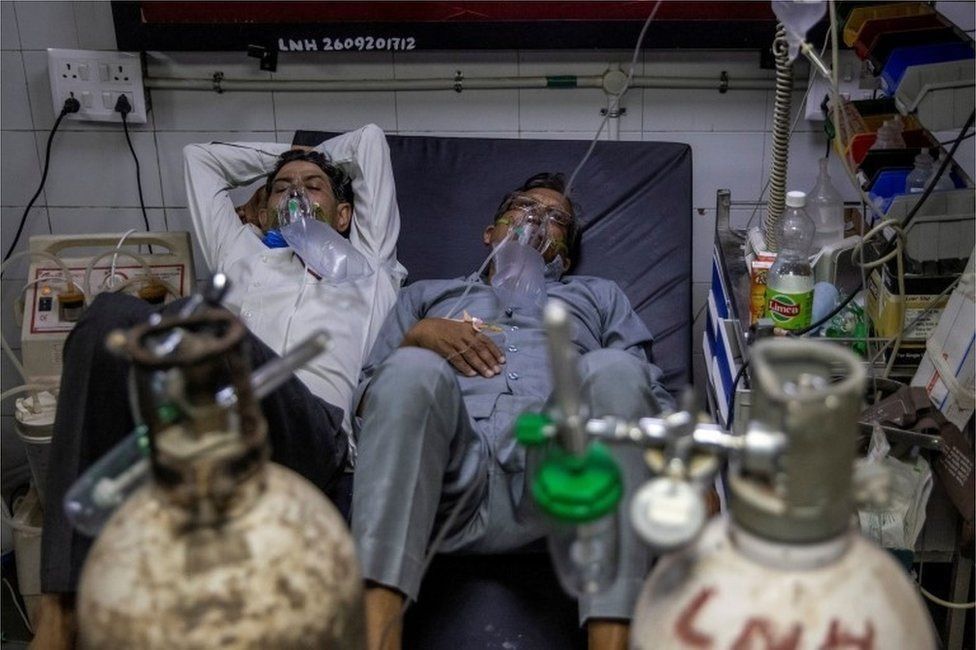Sobering Runaway COVID: Variants of Variants
"WHO is tracking this variant as part of the Delta variant, as we are doing for other Variants of Concern with additional mutations.""For the moment, this variant does not seem to be common, currently accounting for only a small fraction of the Delta sequences ...""Delta and other circulating Variants of Concern remain a higher public health risk as they have demonstrated increases in transmission."World Health Organization"All lineages of the Delta variant are variants of concern [so there is nothing unusual in labelling Delta Plus as such].""We do not have any indicators as of now to show that Delta Plus should be causing any public health worry or panic. We are not seeing anything worrisome yet.""We are tracking it carefully, and strengthening all public health measures."Dr Anurag Agarwal, director, Delhi-based CSIR-Institute of Genomics and Integrative Biology
 |
| The Delta strain was said to be responsible for the deadly second wave of infections Reuters |
"There is no data yet to support the variant of concern claim,""You need biological and clinical information in order to consider whether it is truly a variant of concern.""You need to study a few hundred patients who are sick with this condition and variant and find out whether they are at greater risk of greater disease than the ancestral variant."Dr, Gagandeep Kang, virologist, Fellow of the Royal Society of London"We don't have much reason to believe this is any more dangerous than the original Delta.""Delta Plus might have a slight advantage at infecting and spreading between people who were previously infected earlier during the pandemic or who have weak or incomplete vaccine immunity.""I would keep calm. I don't think India or anyone else in the world has released or accumulated enough data to distinguish the risk from the so-called Delta Plus as being more dangerous or concerning than the original Delta variant."Dr Jeremy Kamil, virologist, Louisiana State University Health Sciences Center, Shreveport
The ongoing complexities and mysteries of SARS-CoV-2. India announced several days ago that it has identified roughly 40 cases of the Delta coronavirus variant that first emerged in India and this variant now carries a mutation appearing to make it even more readily transmissible than the already-more-transmissible Delta strain. It is the Delta strain that has caused a good deal of anxiety in Britain, identified as causing a new wave, and prompting the U.K. to hold off its promised re-opening. In Canada the Delta strain resulted in health authorities speeding up vaccinations in an attempt to head off the eruption of another COVID wave.
There is always the danger of mutations occurring with viruses, pushing health authorities to accelerate inoculation programs before the emergence of a mutation that turns out to be not only more transmissible but even significantly deadlier than the original. In the case of COVID 19, anything more deadly than the original is a nightmare to be avoided at all costs. In India the appearance of the new Delta variant has seen states in the country being cautioned of the urgent requirement to increase their testing.
Delta Plus was reported for the first time in a Public Health England bulletin issued on 11 June. Identified as a sub-lineage of the Delta variant which first emerged in India, Delta Plus has inherited the spike protein mutation called K417N, found as well in the Beta variant first identified in South Africa. The concern among some scientists is that the mutation along with other features of the Delta variant could ensure it is considerably more transmissible than the parent mutant.
"The mutation K417N has been of interest as it is present in the Beta variant (B.1.351 lineage) which was reported to have immune invasion property", stated India's health ministry. The K417N was known -- according to top Indian virologist Shahid Jameel -- to reduce the effectiveness of a number of therapeutic monoclonal antibodies. Resistance to vaccines, in other words, a potential horror story that might leave the world without the hope of vanquishing the pandemic through the miracle medium of anti-COVID vaccines.
To date, the Delta variant has been identified as having appeared in eleven countries altogether; Britain (36), Canada (1), India (40), Japan (15), Nepal (3), Poland (9), Portugal (22), Russia (1), Switzerland (18), Turkey (1), and the United States (83). Around 40 cases of the variant, according to India, have been observed in the states of Maharashtra, Kerala and Madhya Pradesh, with "no significant increase in prevalence". A sample taken on April 5 represents the earliest case identified in India.
On April 26, Britain sequenced its first five cases; contacts of individuals who had travelled from or transited through Nepal and Turkey. Among the U.K and Indian cases no deaths have as yet been reported. In India and throughout the globe, studies are being initiated to test vaccine effectiveness against the mutation. Regions where the Delta variant has been found "may need to enhance their public health response by focusing on surveillance, enhanced testing, quick contact-tracing and priority vaccination".
In India, the concern is obviously that Delta Plus may inflict yet another infection wave, at a time when it has so recently emerged from the world's worst surge in cases. At the present time, some 5.5 percent of Indians have been fully vaccinated, with 18 percent having received at least one dose. Vaccinations have been accelerated to the point where up to six million people are being vaccinated daily. One of the issues of concern is vaccine availability.
"It is most likely capable of dodging immunities", was the opinion of Shahid Jameel, virologist and director of the Trivedi School of Biosciences at Ashoka
University in Sonipat, India. "That is because it carries all symptoms
of the original Delta variant and also from its partner Beta variant."
 |
Labels: Delta Plus, Delta Variant, Global Spread, India, Transmisibility, Vaccine Effectiveness Concerns

0 Comments:
Post a Comment
<< Home